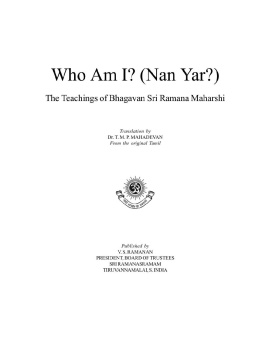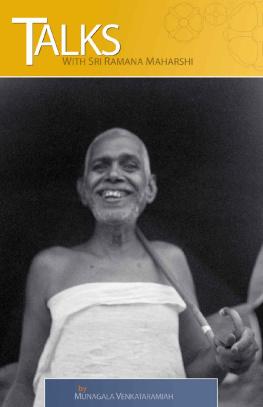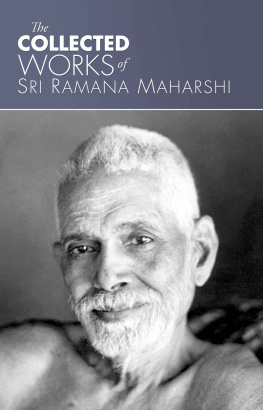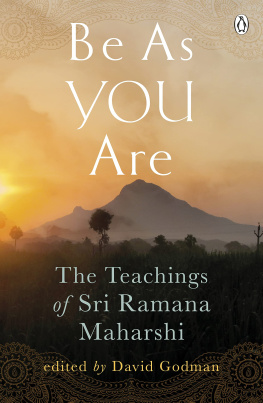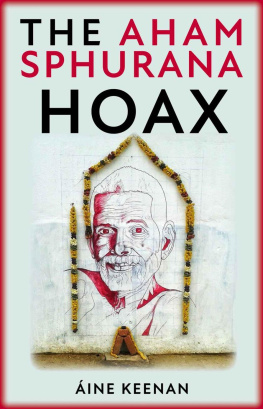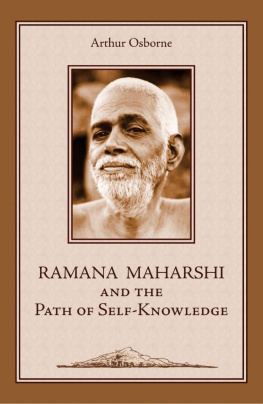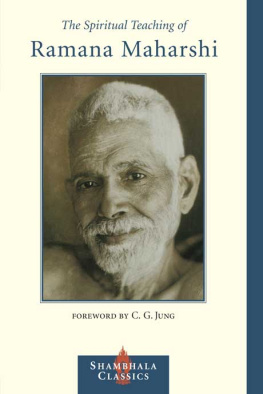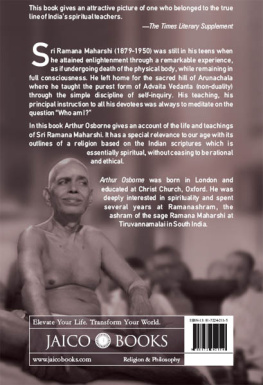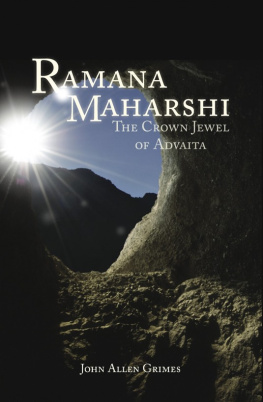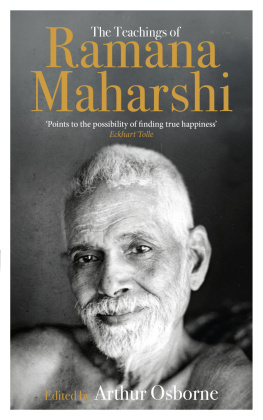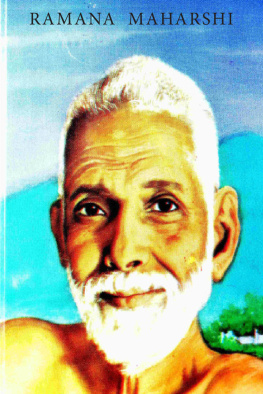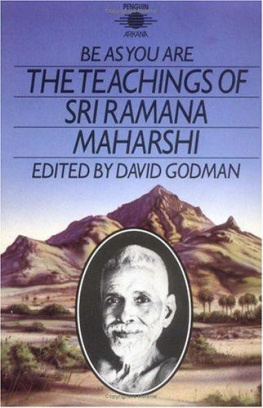Ramana Maharshi - Who Am I?: The Teachings of Bhagavan Sri Ramana Maharshi
Here you can read online Ramana Maharshi - Who Am I?: The Teachings of Bhagavan Sri Ramana Maharshi full text of the book (entire story) in english for free. Download pdf and epub, get meaning, cover and reviews about this ebook. year: 2008, publisher: Sri Ramanasramam, genre: Religion. Description of the work, (preface) as well as reviews are available. Best literature library LitArk.com created for fans of good reading and offers a wide selection of genres:
Romance novel
Science fiction
Adventure
Detective
Science
History
Home and family
Prose
Art
Politics
Computer
Non-fiction
Religion
Business
Children
Humor
Choose a favorite category and find really read worthwhile books. Enjoy immersion in the world of imagination, feel the emotions of the characters or learn something new for yourself, make an fascinating discovery.
- Book:Who Am I?: The Teachings of Bhagavan Sri Ramana Maharshi
- Author:
- Publisher:Sri Ramanasramam
- Genre:
- Year:2008
- Rating:3 / 5
- Favourites:Add to favourites
- Your mark:
- 60
- 1
- 2
- 3
- 4
- 5
Who Am I?: The Teachings of Bhagavan Sri Ramana Maharshi: summary, description and annotation
We offer to read an annotation, description, summary or preface (depends on what the author of the book "Who Am I?: The Teachings of Bhagavan Sri Ramana Maharshi" wrote himself). If you haven't found the necessary information about the book — write in the comments, we will try to find it.
Who Am I?: The Teachings of Bhagavan Sri Ramana Maharshi — read online for free the complete book (whole text) full work
Below is the text of the book, divided by pages. System saving the place of the last page read, allows you to conveniently read the book "Who Am I?: The Teachings of Bhagavan Sri Ramana Maharshi" online for free, without having to search again every time where you left off. Put a bookmark, and you can go to the page where you finished reading at any time.
Font size:
Interval:
Bookmark:
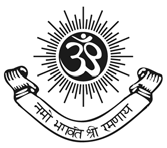
Who Am I? (Nan Yar?)
The Teachings of Bhagavan Sri Ramana Maharshi
Translation by
Dr. T. M. P. MAHADEVAN
From the original Tamil
Published by
V. S. RAMANAN
PRESIDENT, BOARD OF TRUSTEES
SRI RAMANASRAMAM
TIRUVANNAMALAI, S. INDIA
Introduction
Who am I? is the title given to a set of questions and answers bearing on Self-enquiry. The questions were put to Bhagavan Sri Ramana Maharshi by one Sri M. Sivaprakasam Pillai about the year 1902. Sri Pillai, a graduate in Philosophy, was at the time employed in the Revenue Department of the South Arcot Collectorate. During his visit to Tiruvannamalai in 1902 on official work, he went to Virupaksha Cave on Arunachala Hill and met the Master there. He sought from him spiritual guidance, and solicited answers to questions relating to Self-enquiry. As Bhagavan was not talking then, not because of any vow he had taken, but because he did not have the inclination to talk, he answered the questions put to him by gestures, and when these were not understood, by writing. As recollected and recorded by Sri Sivaprakasam Pillai, there were fourteen questions with answers to them given by Bhagavan. This record was first published by Sri Pillai in 1923, along with a couple of poems composed by himself relating how Bhagavans grace operated in his case by dispelling his doubts and by saving him from a crisis in life. Who am I? has been published several times subsequently. We find thirty questions and answers in some editions and twenty-eight in others. There is also another published version in which the questions are not given, and the teachings are rearranged in the form of an essay. The extant English translation is of this essay. The present rendering is of the text in the form of twenty-eight questions and answers.
Along with Vicharasangraham (Self-Enquiry), Nan Yar (Who am I?) constitutes the first set of instructions in the Masters own words. These two are the only prosepieces among Bhagavans Works. They clearly set forth the central teaching that the direct path to liberation is Self-enquiry.
The particular mode in which the enquiry is to be made is lucidly set forth in Nan Yar. The mind consists of thoughts. The I thought is the first to arise in the mind. When the enquiry Who am I? is persistently pursued, all other thoughts get destroyed, and finally the I thought itself vanishes leaving the supreme non-dual Self alone. The false identification of the Self with the phenomena of non-self such as the body and mind thus ends, and there is illumination, Sakshatkara. The process of enquiry of course, is not an easy one. As one enquires Who am I?, other thoughts will arise; but as these arise, one should not yield to them by following them , on the contrary, one should ask To whom do they arise ? In order to do this, one has to be extremely vigilant. Through constant enquiry one should make the mind stay in its source, without allowing it to wander away and get lost in the mazes of thought created by itself. All other disciplines such as breath-control and meditation on the forms of God should be regarded as auxiliary practices. They are useful in so far as they help the mind to become quiescent and one-pointed.
For the mind that has gained skill in concentration, Self-enquiry becomes comparatively easy. It is by ceaseless enquiry that the thoughts are destroyed and the Self realized - the plenary Reality in which there is not even the I thought, the experience which is referred to as Silence.
This, in substance, is Bhagavan Sri Ramana Maharshis teaching in Nan Yar (Who am I?).
University of Madras - June 30, 1982
Om Namo Bhagavathe Sri Ramanaya
Who Am I?
(Nan Yar?)
As all living beings desire to be happy always, without misery, as in the case of everyone thereis observed supreme love for ones self, and as happiness alone is the cause for love, in order togain that happiness which is ones nature and which is experienced in the state of deep sleepwhere there is no mind, one should know ones self. For that, the path of knowledge, the inquiryof the form Who am I?, is the principal means.
1. Who am I ?
The gross body which is composed of the seven humours (dhatus), I am not; the five cognitive sense organs, viz. the senses of hearing, touch, sight, taste, and smell, which apprehend their respective objects, viz. sound, touch, colour, taste, and odour, I am not; the five cognitive sense-organs, viz. the organs of speech, locomotion, grasping, excretion, and procreation, which have as their respective functions speaking, moving, grasping, excreting, and enjoying, I am not; the five vital airs, prana, etc., which perform respectively the five functions of in-breathing, etc., I am not; even the mind which thinks, I am not; the nescience too, which is endowed only with the residual impressions of objects, and in which there are no objects and no functionings, I am not.
2. If I am none of these, then who am I?
After negating all of the above-mentioned as not this, not this, that Awareness which alone remains - that I am.
3. What is the nature of Awareness?
The nature of Awareness is existence-consciousness-bliss
4. When will the realization of the Self be gained?
When the world which is what-is-seen has been removed, there will be realization of the Self which is the seer.
5. Will there not be realization of the Self even while the world is there (taken as real)?
There will not be.
6. Why?
The seer and the object seen are like the rope and the snake. Just as the knowledge of the rope which is the substrate will not arise unless the false knowledge of the illusory serpent goes, so the realization of the Self which is the substrate will not be gained unless the belief that the world is real is removed.
7. When will the world which is the object seen be removed?
When the mind, which is the cause of all cognitions and of all actions, becomes quiescent, the world will disappear.
8. What is the nature of the mind?
What is called mind is a wondrous power residing in the Self. It causes all thoughts to arise.
Apart from thoughts, there is no such thing as mind. Therefore, thought is the nature of mind. Apart from thoughts, there is no independent entity called the world. In deep sleep there are no thoughts, and there is no world. In the states of waking and dream, there are thoughts, and there is a world also. Just as the spider emits the thread (of the web) out of itself and again withdraws it into itself, likewise the mind projects the world out of itself and again resolves it into itself. When the mind comes out of the Self, the world appears. Therefore, when the world appears (to be real), the Self does not appear; and when the Self appears (shines) the world does not appear. When one persistently inquires into the nature of the mind, the mind will end leaving the Self (as the residue).
What is referred to as the Self is the Atman. The mind always exists only in dependence on something gross; it cannot stay alone. It is the mind that is called the subtle body or the soul (jiva).
9. What is the path of inquiry for understanding the nature of the mind?
That which rises as I in this body is the mind. If one inquires as to where in the body the thought I rises first, one would discover that it rises in the heart. That is the place of the minds origin.
Even if one thinks constantly I I, one will be led to that place. Of all the thoughts that arise in the mind, the I thought is the first. It is only after the rise of this that the other thoughts arise. It is after the appearance of the first personal pronoun that the second and third personal pronouns appear; without the first personal pronoun there will not be the second and third.
Next pageFont size:
Interval:
Bookmark:
Similar books «Who Am I?: The Teachings of Bhagavan Sri Ramana Maharshi»
Look at similar books to Who Am I?: The Teachings of Bhagavan Sri Ramana Maharshi. We have selected literature similar in name and meaning in the hope of providing readers with more options to find new, interesting, not yet read works.
Discussion, reviews of the book Who Am I?: The Teachings of Bhagavan Sri Ramana Maharshi and just readers' own opinions. Leave your comments, write what you think about the work, its meaning or the main characters. Specify what exactly you liked and what you didn't like, and why you think so.

